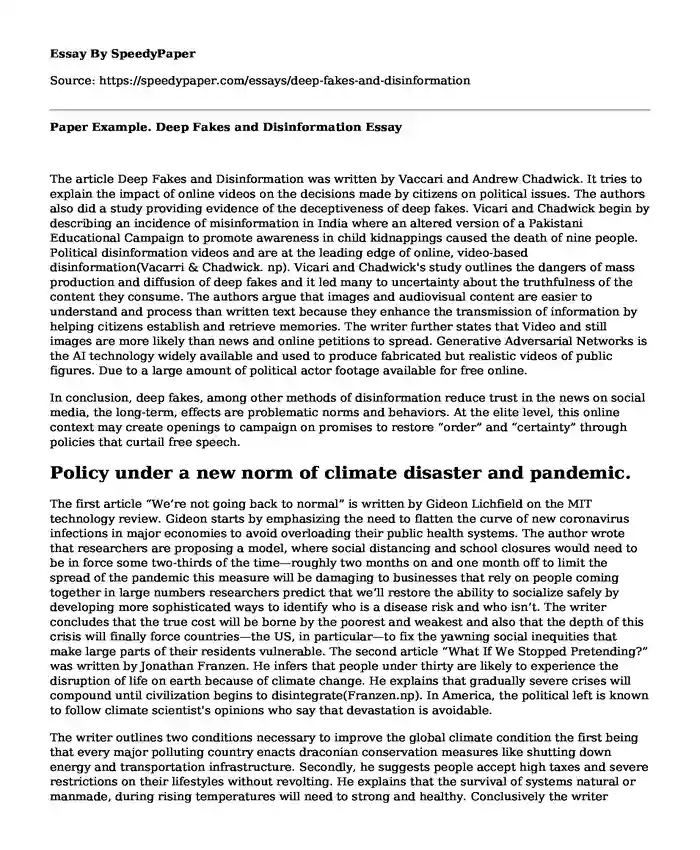
| Essay type: | Analytical essays |
| Categories: | Media Social media Social issue |
| Pages: | 3 |
| Wordcount: | 634 words |
The article Deep Fakes and Disinformation was written by Vaccari and Andrew Chadwick. It tries to explain the impact of online videos on the decisions made by citizens on political issues. The authors also did a study providing evidence of the deceptiveness of deep fakes. Vicari and Chadwick begin by describing an incidence of misinformation in India where an altered version of a Pakistani Educational Campaign to promote awareness in child kidnappings caused the death of nine people. Political disinformation videos and are at the leading edge of online, video-based disinformation(Vacarri & Chadwick. np). Vicari and Chadwick's study outlines the dangers of mass production and diffusion of deep fakes and it led many to uncertainty about the truthfulness of the content they consume. The authors argue that images and audiovisual content are easier to understand and process than written text because they enhance the transmission of information by helping citizens establish and retrieve memories. The writer further states that Video and still images are more likely than news and online petitions to spread. Generative Adversarial Networks is the AI technology widely available and used to produce fabricated but realistic videos of public figures. Due to a large amount of political actor footage available for free online.
In conclusion, deep fakes, among other methods of disinformation reduce trust in the news on social media, the long-term, effects are problematic norms and behaviors. At the elite level, this online context may create openings to campaign on promises to restore “order” and “certainty” through policies that curtail free speech.
Policy under a new norm of climate disaster and pandemic.
The first article “We’re not going back to normal” is written by Gideon Lichfield on the MIT technology review. Gideon starts by emphasizing the need to flatten the curve of new coronavirus infections in major economies to avoid overloading their public health systems. The author wrote that researchers are proposing a model, where social distancing and school closures would need to be in force some two-thirds of the time—roughly two months on and one month off to limit the spread of the pandemic this measure will be damaging to businesses that rely on people coming together in large numbers researchers predict that we’ll restore the ability to socialize safely by developing more sophisticated ways to identify who is a disease risk and who isn’t. The writer concludes that the true cost will be borne by the poorest and weakest and also that the depth of this crisis will finally force countries—the US, in particular—to fix the yawning social inequities that make large parts of their residents vulnerable. The second article “What If We Stopped Pretending?” was written by Jonathan Franzen. He infers that people under thirty are likely to experience the disruption of life on earth because of climate change. He explains that gradually severe crises will compound until civilization begins to disintegrate(Franzen.np). In America, the political left is known to follow climate scientist's opinions who say that devastation is avoidable.
The writer outlines two conditions necessary to improve the global climate condition the first being that every major polluting country enacts draconian conservation measures like shutting down energy and transportation infrastructure. Secondly, he suggests people accept high taxes and severe restrictions on their lifestyles without revolting. He explains that the survival of systems natural or manmade, during rising temperatures will need to strong and healthy. Conclusively the writer suggests a more balanced portfolio of hopes, some long-term, others shorter.
Works Cited
Vaccari, Cristian, and Andrew Chadwick. "Deepfakes and disinformation: exploring the impact of synthetic political video on deception, uncertainty, and trust in news." Social Media+ Society 6.1 (2020): 2056305120903408.https://journals.sagepub.com/doi/abs/10.1177/2056305120903408
"We’Re Not Going Back To Normal". MIT Technology Review, 2020, https://www.technologyreview.com/2020/03/17/905264/coronavirus-pandemic-social-distancing-18-months.
Franzen, Jonathan. "What If We Stopped Pretending The Climate Apocalypse Can Be Stopped?". The New Yorker, 2020, https://www.newyorker.com/culture/cultural-comment/what-if-we-stopped-pretending.
Cite this page
Paper Example. Deep Fakes and Disinformation. (2023, Oct 29). Retrieved from https://speedypaper.net/essays/deep-fakes-and-disinformation
Request Removal
If you are the original author of this essay and no longer wish to have it published on the SpeedyPaper website, please click below to request its removal:
- Essay Sample on Situation Analysis of Polaris
- Free Essay Example. Ethical Dilemma: Euthanasia
- Essay Example. Abortion is Morally Wrong
- Paper Example: Role of Visionaries and Progressives in Instituting Government Planning
- Essay Example: How Independent Films Achieve Culture Value
- Essay Sample on Emerging Forms of Media: Technology's Impact on My Life
- Navigating Ethical Dilemmas: College Students and the Social Media Conundrum - Paper Sample
Popular categories




